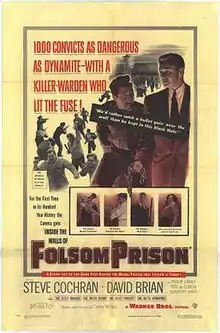| Inside the Walls of Folsom Prison | |
|---|---|
 Theatrical release poster | |
| Directed by | Crane Wilbur |
| Written by | Crane Wilbur |
| Produced by | Bryan Foy |
| Starring | Steve Cochran David Brian |
| Narrated by | William Woodson |
| Cinematography | Edwin B. DuPar |
| Edited by | Owen Marks |
| Music by | William Lava |
| Color process | Black and white |
Production company | Warner Bros. |
| Distributed by | Warner Bros. |
Release date |
|
Running time | 87 minutes |
| Country | United States |
| Language | English |
Inside the Walls of Folsom Prison is a 1951 American film noir crime film directed by Crane Wilbur and starring Steve Cochran and David Brian.[1][2] Set in Folsom State Prison in California, the film was seen both in the United States and Europe.[3][4]
Country singer Johnny Cash saw this movie while serving in the United States Air Force in West Germany in October 1951, and used it as an inspiration for his hit song "Folsom Prison Blues," which he recorded numerous times between 1955 and his death in 2003.
The film was featured in the 2005 biographical film Walk the Line, in which Cash (played by Joaquin Phoenix) and other Air Force personnel are depicted seeing the film.
Plot
During the 1920s, before the 1944 California prison reform, Warden Ben Rickey rules Folsom Prison with a ruthless hand. He believes that prisons should be used for punishment, rather than rehabilitation to reduce the incidence of repeated returns to jail (recidivism). His methods are violent, torturous, and intended to beat the prisoners into submission.
Chuck Daniels, one of the toughest inmates, and his group of followers are intent on escaping. However, after an attempt which is thwarted by Rickey, a riot ensues resulting in the deaths of two officers and a few prisoners. Rickey, with his iron fist, doles out severe and cruel punishments to all prisoners connected to the incident.
In response to increasing violence, and the warden's inhumane treatment, the prison's board of directors hire an assistant, Mark Benson, as captain of the guards. He believes that the inmates, despite their serious crimes, deserve to be treated better and given an opportunity to change by being educated on how to live on the outside, prior to release, in order to increase their chances of becoming productive members of society. Benson makes many changes to the regimen including serving meat, allowing inmates to talk during meal times, and promoting rehabilitation programs such as employment help. He also changes the way the guards do their jobs as well, by expecting them to come to work clean, behave in a professional way, and discontinue the senseless beatings that cause trouble.
These changes go against the wishes of the warden and Benson eventually leaves his post as captain of the guards. With Benson gone, Warden Rickey reverts all of the reforms and the inmates retaliate with yet another escape attempt. A riot erupts in which many are fatally wounded.
Cast
- Steve Cochran as Chuck Daniels
- David Brian as Mark Benson
- Philip Carey as Red Pardue
- Ted de Corsia as Warden Ben Rickey (as Ted De Corsia)
- Scott Forbes as Jim Frazier
- Michael Tolan as Leo Daly (as Lawrence Tolan)
- Dick Wesson as Tinker
- Paul Picerni as Jeff Riordan
- William Campbell as Nick Ferretti
- Edward Norris as Sgt. Cliff Hart (as Eddie Norris)
References
- ↑ Parish, James Robert; Pitts, Michael R. (1987). The Great Gangster Pictures II. Scarecrow Press. p. 215. ISBN 9780810819610. Retrieved 15 November 2019.
- ↑ Silverman, Jonathan (2010). Nine Choices: Johnny Cash and American Culture. Univ of Massachusetts Press. p. 92. ISBN 9781558498273. Retrieved 15 November 2019.
Inside the Walls of Folsom Prison.
- ↑ Streissguth, Michael (2019). Johnny Cash at Folsom Prison: The Making of a Masterpiece, Revised and Updated. Univ. Press of Mississippi. ISBN 9781496824912. Retrieved 15 November 2019.
- ↑ Knight, Gladys L. (2014). Pop Culture Places: An Encyclopedia of Places in American Popular Culture [3 volumes]. ABC-CLIO. p. 292. ISBN 9780313398834. Retrieved 15 November 2019.